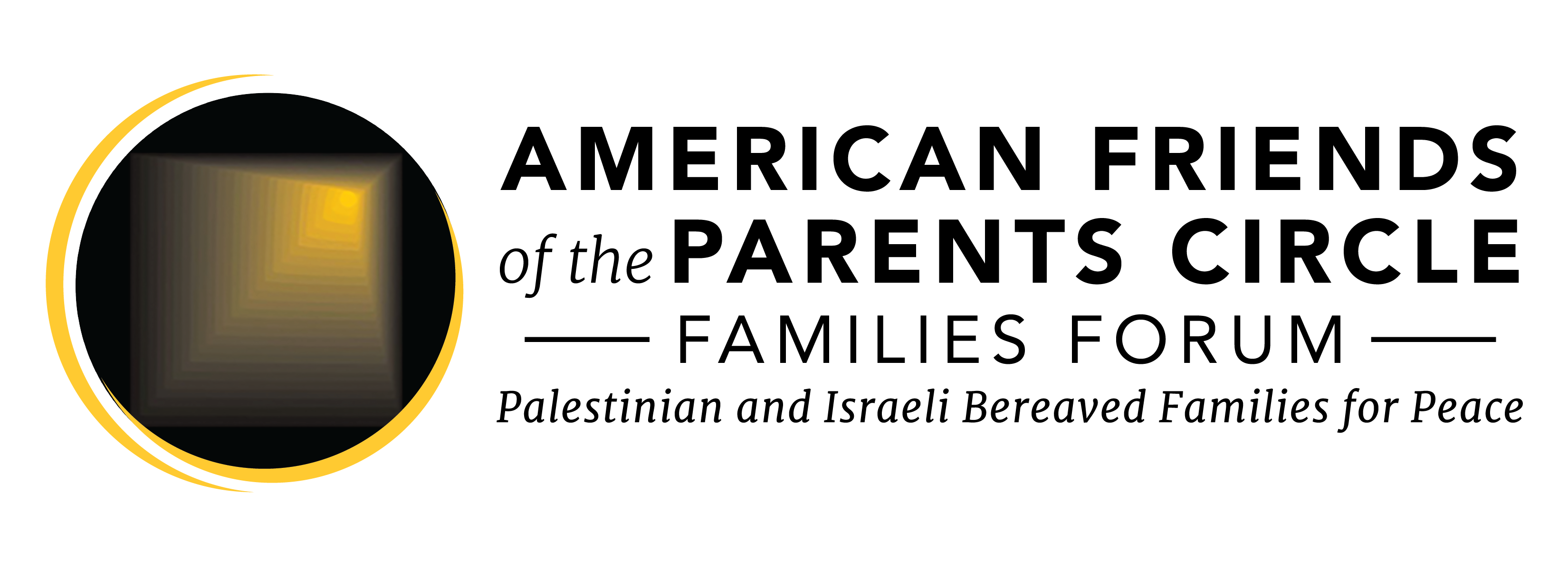Members and supporters of the new government, fueled by hatred and fear, seem to have lost all respect for bereaved parents of victims killed in the conflict. Before they judge us, they must listen to our harrowing stories
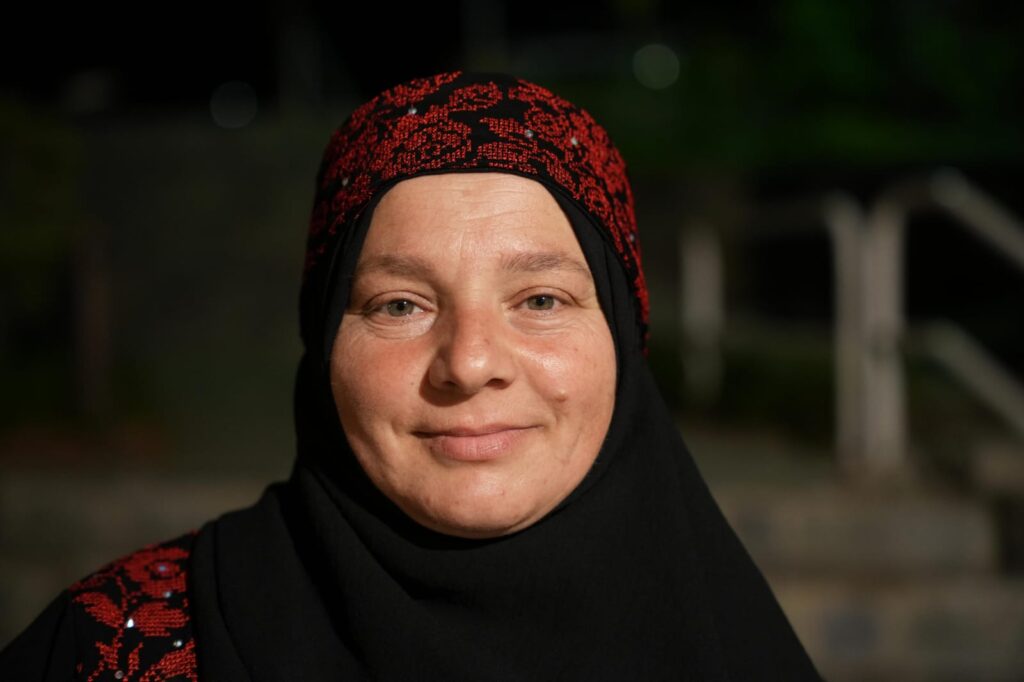
My name is Zeinat Awad, from Beit Ummar in the West Bank.
My children were born into a reality burdened by occupation, growing up witnessing daily scenes of oppression—killings, arrests, land confiscation, and the relentless expansion of settlements. My eldest son, Jaafar, was an ambitious young man, who believed that the future of his homeland could be built through education and went to law school so he could work for justice for his people. He also had a black belt in karate, and dreamed of representing Palestine in international tournaments.
One day on his way to university, he passed through a checkpoint—as usual—and his life changed forever. An Israeli soldier stopped his car, slapped him, and humiliated him in front of others. In that moment, Jaafar felt how easily a person’s dignity could be crushed, and that justice—the very thing he was studying—was absent under the occupation.
In deep frustration, a thought took shape in his mind—as he later admitted—to “teach the occupation a harsh lesson.” It was only a thought, nothing more. But before he acted upon it, the Israeli military arrested him and charged him not for an act, but for the thought itself.
Inside prison, Jaafar suffered from multiple illnesses and in early 2015, Jaafar was released in a frail and weak condition. We took him to a doctor who told me “Your son will not live for more than three months”.
We took Jaafar on an exhausting journey through hospitals for treatments—Al Ahli, Al Makassed, Al Mutlaa, and Al Mezan hospitals —where he finally passed away on April 10, 2015.
Today I am a member of the Parents Circle, and firmly believe that pain can be transformed into a force for justice and peace. My suffering continues, as my two younger sons are currently in administrative detention, with no reason given, and the youngest is only 16 years old.
Despite my loss and pain, I believe in life and in my son’s dream of education and justice. I now carry two voices within me: one of a mother who has lost her son, and one of a woman who believes that another future is possible.
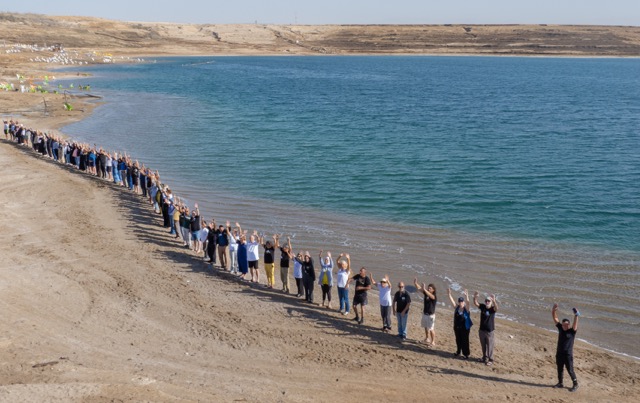
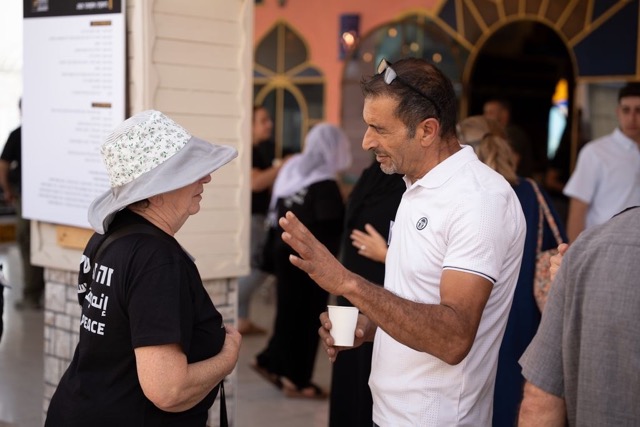
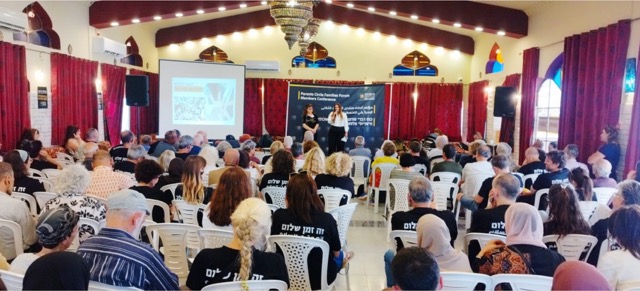
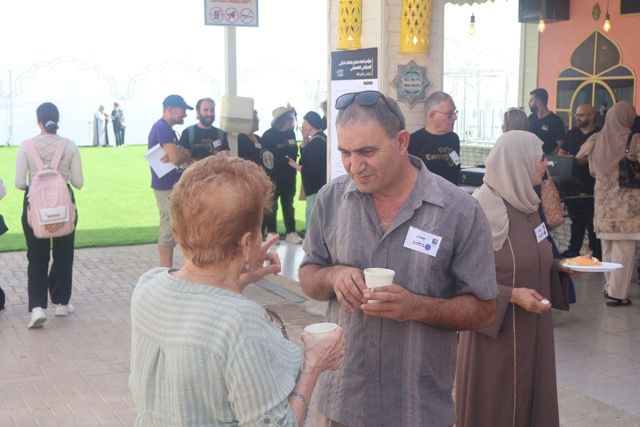
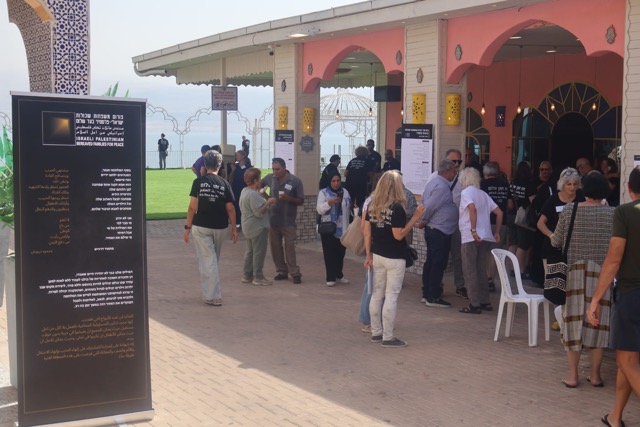
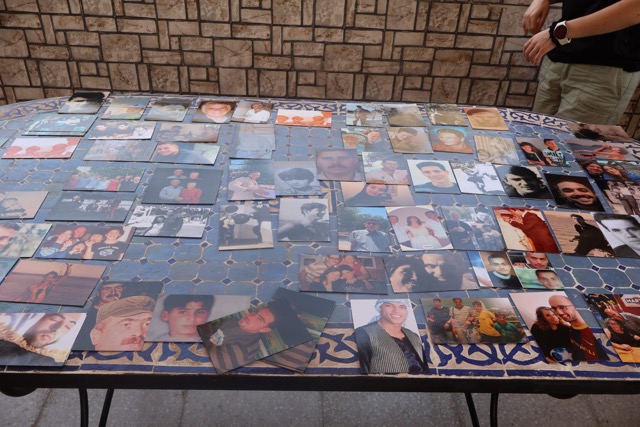
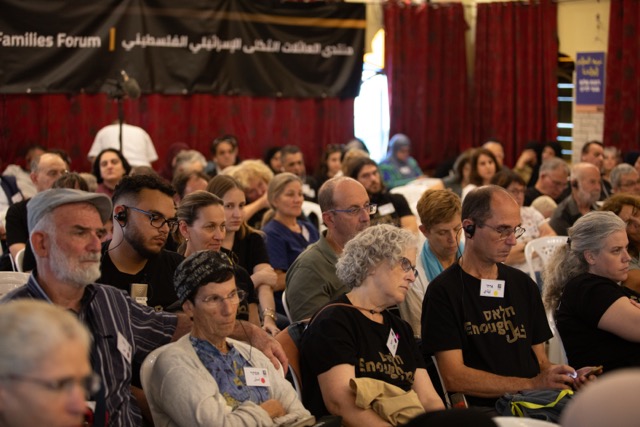
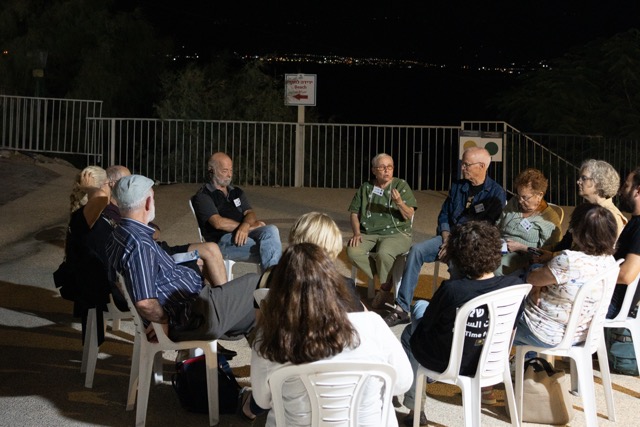
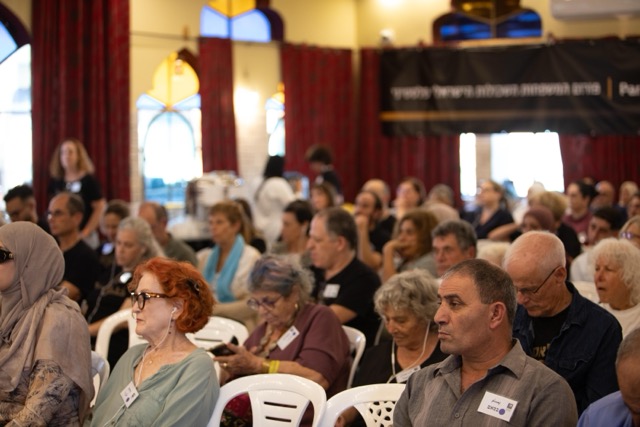
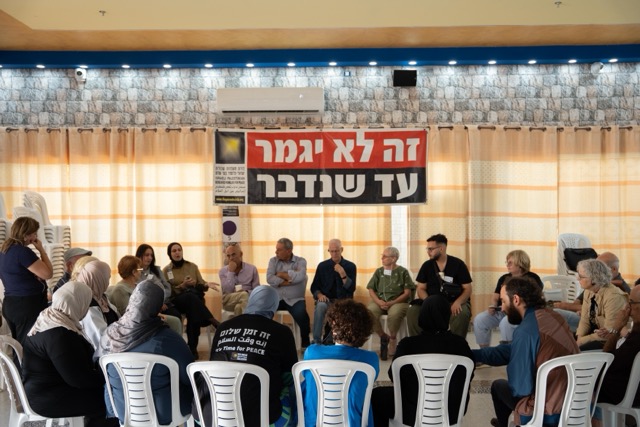
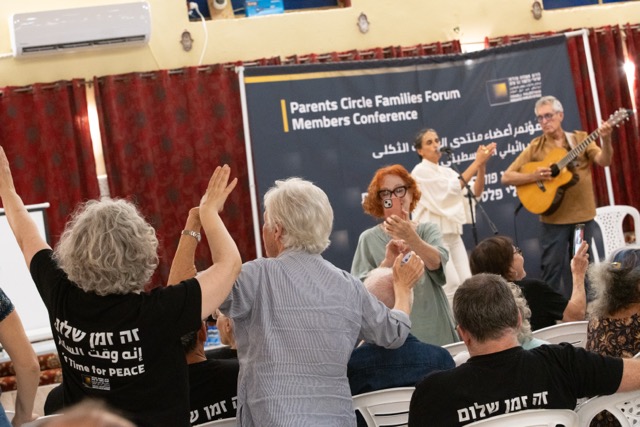
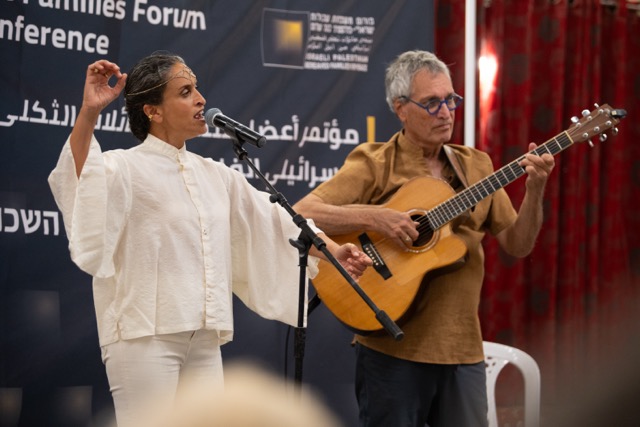
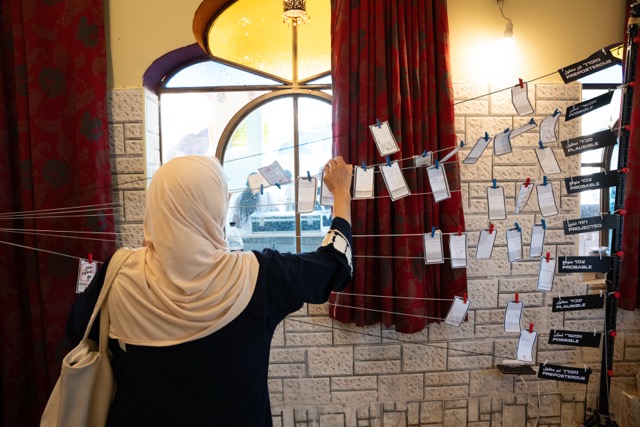
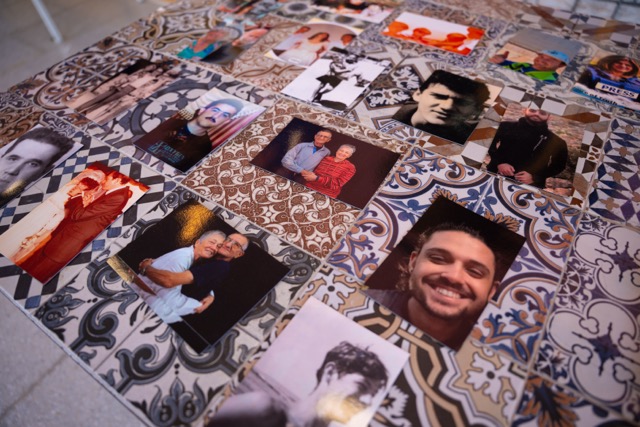
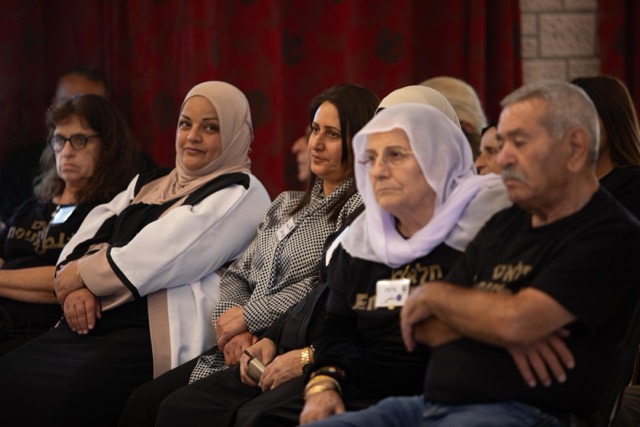
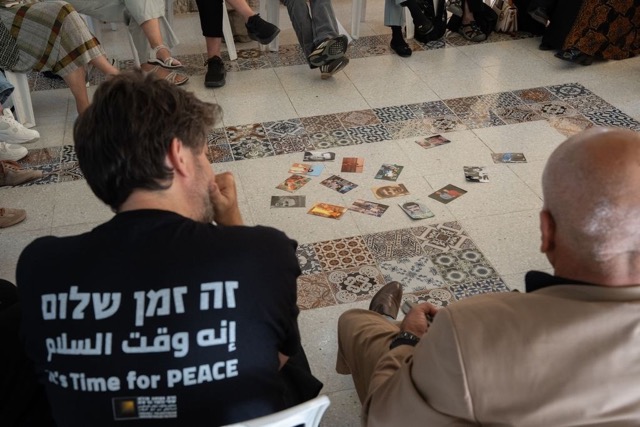
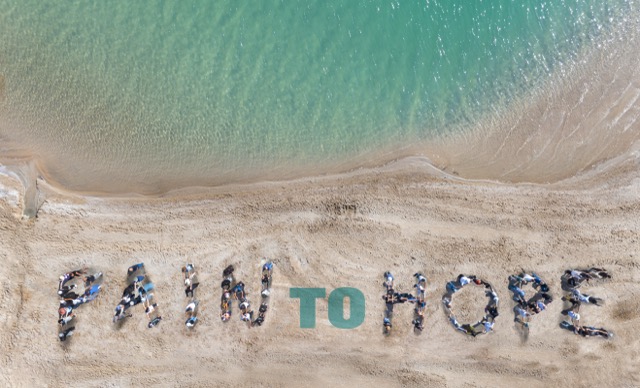
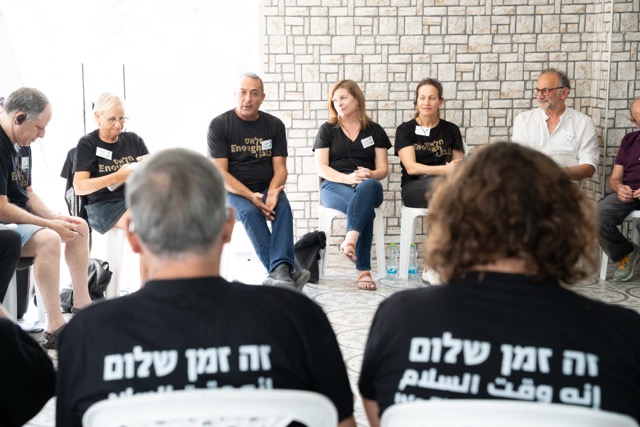
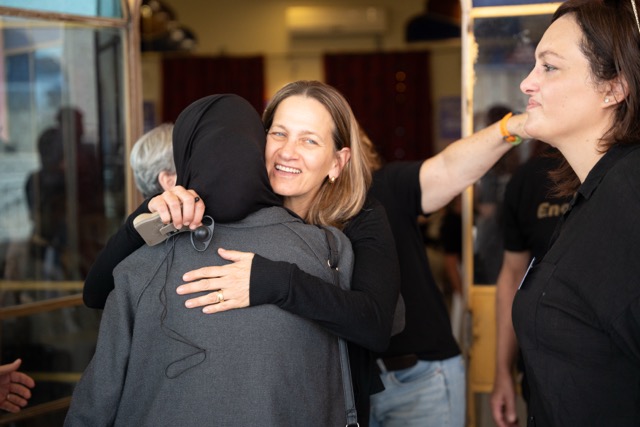
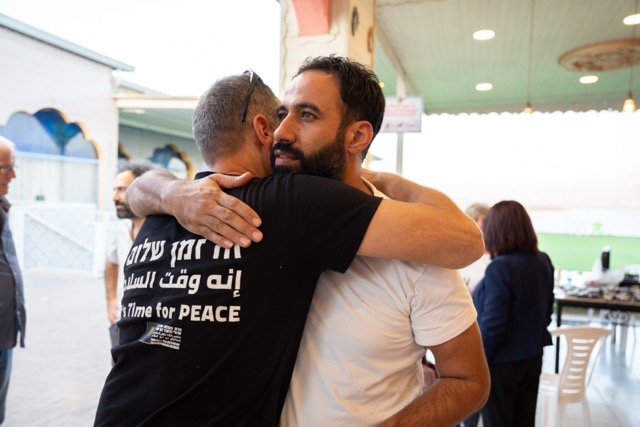
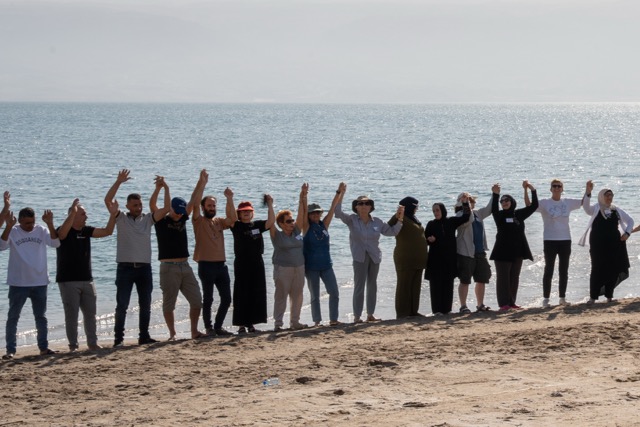
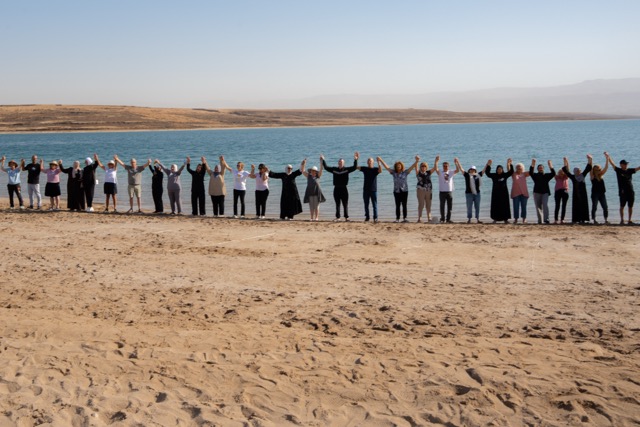
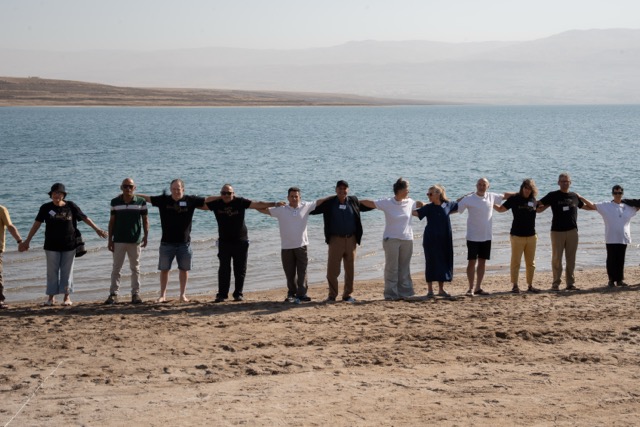
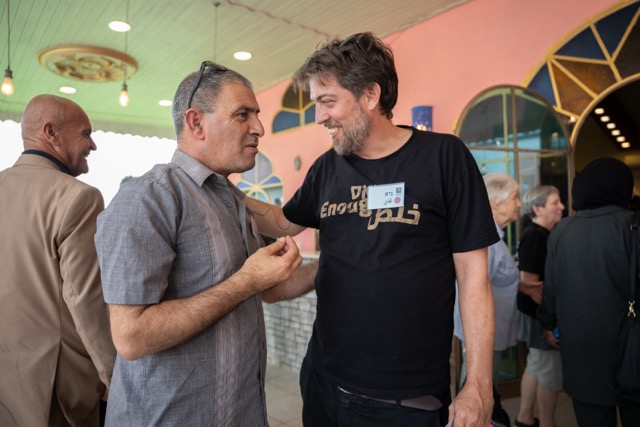
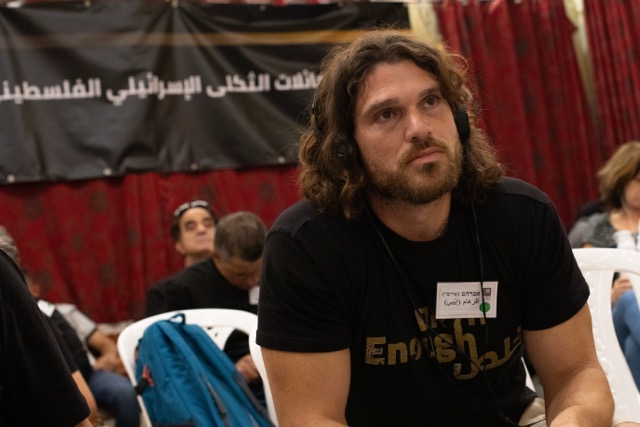
On October 30-31, over 150 bereaved Palestinians and Israelis gathered by the Dead Sea for the Parents Circle Conference. After three years of small in-person gatherings and many zoom meetings—from Covid, wartime, and military restrictions—this large gathering of hope and action is nothing short of a miracle.
The gathering consisted of dialogue meetings, political imagination workshops, and community-building activities. For many new members, it was their first time to spend time with the “other side”.
Among the stories we heard were those of new PCFF members Liora, who shared how her son was killed on October 7, 2023 while she was trapped in the safe room of her home, and Hala, who told the story of her family — she lost 57 relatives in Gaza, including her sister and her sister’s children.
The two women stood side by side, united in pain and in their shared determination to build a future based on justice, security, equality, and an end to the occupation.
“I take from this conference the belief that there is a future. We live in a world that says peace is unrealistic, that mutual destruction is the only possible future. They tell me I’m naïve, disconnected from reality, but I believe we must stand firm and continue to make a difference.”
Israeli participant
“I always say: from meeting comes understanding, from understanding comes action, and from action comes shared action. Together, we will walk toward a future ruled by peace. Working with the Parents Circle makes me feel that such a future is possible.”
Palestinian participant
Meeting together, Israelis and Palestinians build trust and solidarity across borders, and a nurturing community that helps catalyze the grief into action. These members won’t give up on peace in the face of injustice; we hope you will join them.
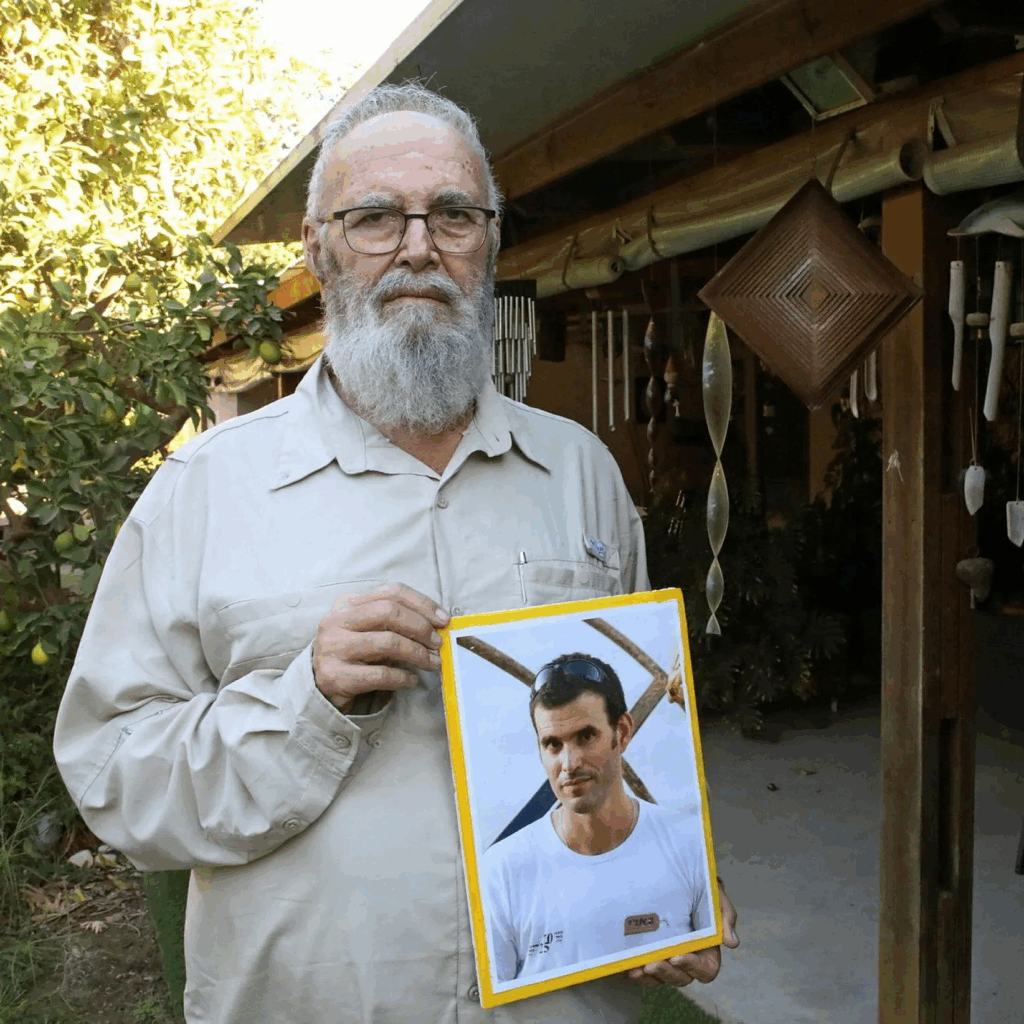
My name is Yuval Or, from Kibbutz Re’im.
On October 7, 2023, my son Dror and his wife Yonat were killed in their home, and three of my grandchildren were taken hostage to Gaza, along with Dror’s body. Our lives were destroyed.
After 50 days, my grandchildren returned home thanks to a hostage exchange deal. I don’t know what I would have done without them. I have been their primary caretaker since then, because they are orphaned.
Dror’s body is still held in Gaza. When we buried his wife we left an empty plot next to her, and we hope he will be returned so they can rest together.
After everything I’ve been through, I still believe in peace. War is not a solution. The peace I’m suggesting is not a romantic notion, it’s practical. To compromise, to manage to live together, to make agreements.
I don’t see how Palestinians will forgive Israel for what we did in Gaza, and I don’t see how Israel will forgive Hamas for what they did on October 7th. I wish something would spring up here, that something new would begin, and that slowly, peace would come from within, but we have so much hatred and pain and bereavement on both sides.
But, I believe that a Palestinian in Khan Younis wants the same thing as me: to raise our kids and to live a quiet life. And we must reconcile this horrible chapter in our history so that future generations – my grandchildren – don’t have to experience this again.
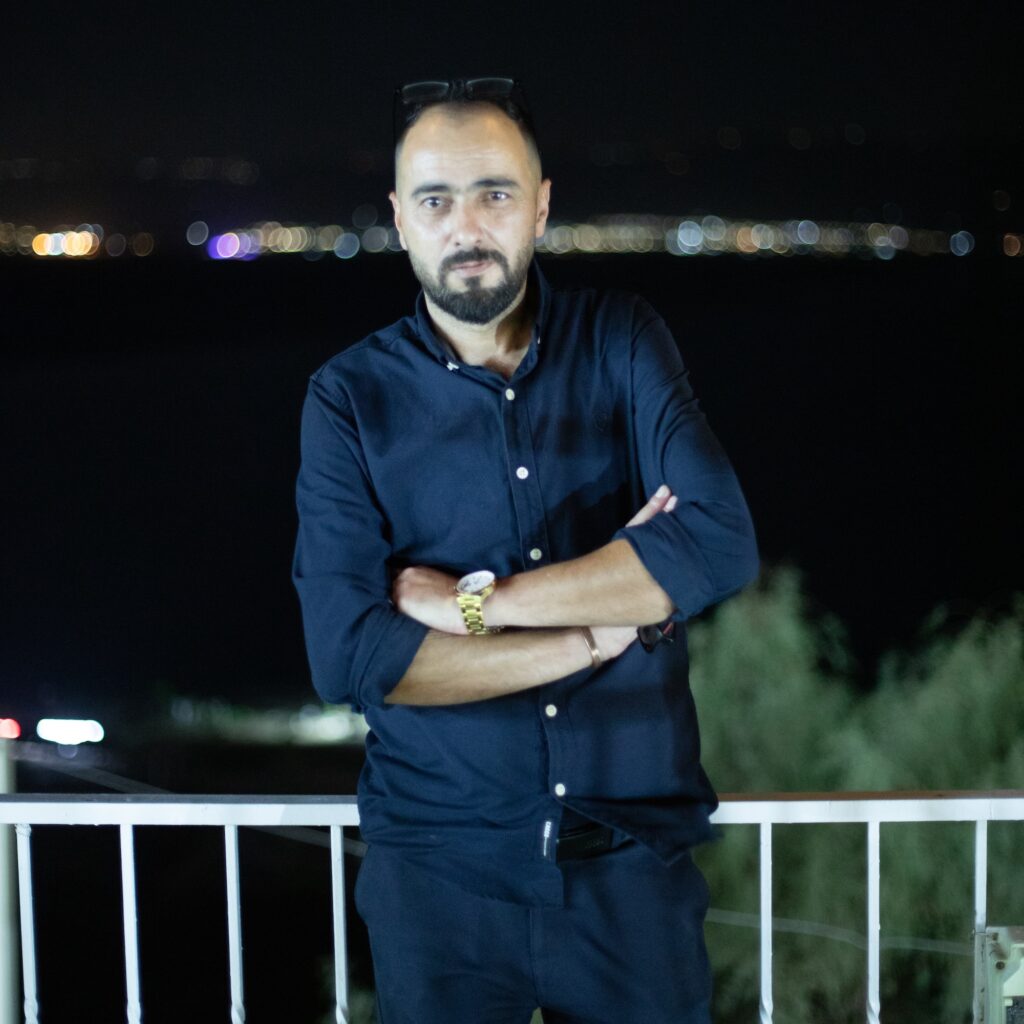
My name is Mohammad Al-Baw, I live in Halhul, a small village near Hebron. I joined the Parents Circle after my brother, Ferras, was killed in 2002 during the Second Intifada.
Two months ago, Israelis from a settlement nearby came to my family’s and my uncle’s family’s vineyards, about 16 acres of land passed down from my father, and pitched a tent. They planted an Israeli flag in the soil my father and grandfather cultivated. Israeli soldiers built a yellow gate blocking any Palestinian from entering. The soldiers guard the settlers. When I tried to walk onto my land, an officer told me, “You’re not allowed to enter.” His reason: “That’s the policy.” And just like that, a new policy was born.
On another day, when I filmed this scene, a soldier smashed my phone and said, “If you don’t leave now, I’ll kill you.” When I told him that if he is standing on my land, that is occupation, he replied, “There is no occupation.” He noticed the photos of my daughters in my wallet and asked if I worried about them. I told him: “Of course I am. You can take your children and go anywhere. I have only this place. We are like a fish. If you take it out of water, it will die.” His answer, “Okay, so die.”
These moments never make it into official records. They are not rare; they are happening across the West Bank. In the past, settlers might throw stones or burn a house. Today, they kill. There is no law here that protects us. The Israeli military protects them; Israeli police do not help us; Palestinian police cannot or do not protect us from settler violence.
Some people ask why I still work with Israelis. My answer is that if you believe in something, you don’t hesitate or give up. Even now, especially now, I meet with my Israeli colleagues. It is not easy.
My work with the Parents Circle has taken me into Israeli high schools and communities to tell my story in Hebrew, to speak about the Palestinian experience, and to insist that there is more to our lives than the black-and-white narratives of good and evil that we are taught.
I am Liat Atzili from Kibbutz Nir Oz.
My partner, Aviv and I built a life and a family in Nir Oz. We were an inseparable part of this little community, which fulfilled our aspirations and needs. Mine as an educator, and Aviv’s as a farmer and an artist.
On October 7th, our kibbutz was attacked, conquered, and destroyed by Hamas. A quarter of the residents were either killed or kidnapped, including me. The time I spent as a hostage in Gaza was of complete despair, unending fear for my friends and family, and long days. I was nervous that I wouldn’t survive.
After 54 days in captivity, I was returned home. The following day, my family and I were told that Aviv was killed on October 7th. Aviv had hundreds of friends, he traveled and created, and made the most of every opportunity; he truly loved life.In his final year, Aviv fulfilled many dreams, the greatest being to share his art publicly. While managing the kibbutz’s agricultural garage, he painted on tractor parts and scrap metal, blending his love for metals and the Negev fields into his creations. Our children looked up to him and I feel like I had the greatest privilege to share my life with him.
I always believed that war is not our destiny, and that any conflict, including ours, can be solved. This war has proven to me beyond a doubt that we cannot continue fighting, that we have no right to impose the continued suffering of war on future generations on either side. I am ready today, more than ever, to do everything in my power so that our children can live here in peace and security.
My name is Hala Al-Bukhari, and I live in Jerusalem.
My sister and her large family, including children and grandchildren live in Gaza. Despite the distance, I used to communicate with them daily, checking on their health via video call.
On the morning of October 7, 2023, my son told me to watch TV to see what was happening in southern Israel. From that day, fear has overwhelmed my heart.
Then came the morning of October 18, 2023, bringing the fateful news: My sister’s house was bombed, and she, her husband, her children, and grandchildren were in the house—33 innocent lives lost in this horrific massacre.
Two years later, and I’m not giving up.
With every word I write, I struggle to express the extent of my pain. Our hearts bleed with grief for those we have lost and continue to lose. Our sorrow is profound, and our souls yearn for the peace we all dream of.
Let us all live in peace and build a better future for our children. War brings only destruction and ruin to everyone involved, whether Palestinian or Israeli. It is always the innocent people who suffer the most.
I am Kholoud Houshiya and I live in the village of Al Yamun near Jenin. Originally my family is from Haifa. I wasn’t able to experience childhood due to the occupation, which forcibly displaced my family to Jenin under oppression and humiliation.
Later, I married and I gave birth to my first child, whom I named Mohammed. I raised him with all my love and effort.
Mohammed was a young man who loved life dearly, and he loved me even more. He was both my son and my friend, thanks to our close bond.
Mohamad was 23 years old. He worked in Israel and helped his father.
On January 2, 2024 Mohamed took a picture of the Israeli army tearing down my neighbor’s house. The army thought otherwise and they shot him. Just because he was Palestinian.
I always dreamed of seeing my son as a groom, just like any mother. But now, I am left with him buried in my garden. I had hoped to see him, his wife, and his children in my house, but now, every day, I look at his grave from the window in my room.
My message to the world is this: Enough. Enough killing, enough injustice, enough destruction, enough oppression. Enough violence on both sides.
It is not easy for a mother to recount the story of her son’s death—the pain is indescribable. I cannot bear the loss of another child. This is why we must raise the voice of the mothers for a better future for all children and young generations – Palestinians and Israelis.
I am Hala Al-Bukhari, living in Jerusalem.
My daughter, my sister and her large family, children and grandchildren live in Gaza. Despite the distance, before the war, I used to communicate with them daily, checking on their health via video call.
On the morning of October 7th, my son told me to watch TV to see what was happening in southern Israel. From that day, fear has overwhelmed my heart.
Then came the morning of October 18th, bringing the harsh news: My sister’s house was bombed, and she, her husband, her children, and grandchildren were in the house—33 innocent lives lost in this horrific massacre. Since then, my fear for my daughter has grown. I have pleaded with human rights organizations, seeking any means to get her out of the hell of war and the horror of the massacres. Eventually we succeeded to get my daughter out of Gaza.
With every word I write, I struggle to express the extent of my pain. Our hearts bleed with grief for those we have lost and continue to lose. Our sorrow is profound, and our souls yearn for the peace we all dream of.
Let us all live in peace and build a better future for our children. War brings only destruction and ruin to everyone involved, whether Palestinian or Israeli. It is always the innocent people who suffer the most.
I am Liat Atzili from Kibbutz Nir Oz.
My partner, Aviv and I built a life and a family in Nir Oz. We were an inseparable part of this little community, which fulfilled our aspirations and needs. Mine as an educator, and Aviv’s as a farmer and an artist.
On October 7th, our kibbutz was attacked, conquered, and destroyed by Hamas. A quarter of the residents were either killed or kidnapped, including me. The time I spent as a hostage in Gaza was of complete despair, unending fear for my friends and family, and long days. I was nervous that I wouldn’t survive.
After 54 days in captivity, I was returned home. The following day, my family and I were told that Aviv was killed on October 7th. Aviv had hundreds of friends, he traveled and created, and made the most of every opportunity; he truly loved life.In his final year, Aviv fulfilled many dreams, the greatest being to share his art publicly. While managing the kibbutz’s agricultural garage, he painted on tractor parts and scrap metal, blending his love for metals and the Negev fields into his creations. Our children looked up to him and I feel like I had the greatest privilege to share my life with him.
I always believed that war is not our destiny, and that any conflict, including ours, can be solved. This war has proven to me beyond a doubt that we cannot continue fighting, that we have no right to impose the continued suffering of war on future generations on either side. I am ready today, more than ever, to do everything in my power so that our children can live here in peace and security.
I am Mazen from Bethlehem. Many of my family members live in Beit Lahiya, Gaza. They lived in a beautiful house and went on about their lives, despite the siege.
It all stopped on October 10, 2024, when, my uncle, his three sons, and his son-in-law were outside near the house. Israeli aircraft targeted them with bombardment and gunfire. My aunt managed to bring their bodies into the house. With trembling hands, she was forced to gather what remained of them, unable for over a week to lay her husband and three sons to rest.
I cannot believe that so many of my family are dead, and that I cannot go there to help them and cry with them.
The depth of pain in Gaza is beyond description and cannot be fathomed by the human mind. How much longer will this hatred on both sides continue? How much longer will we endure this nightmare? All the Palestinian people desire is a dignified life free from occupation—a fundamental right, just like that of any other people in the world.
The suffering will not cease until we collectively seek pathways to peace and understanding. Revenge will not forge a shared future; we must strive to find common ground and solidarity. Let us unite for a brighter future for the generations to come, and let us raise our voices for peace, so that together we may end this cycle of violence and finally live in safety and harmony.
